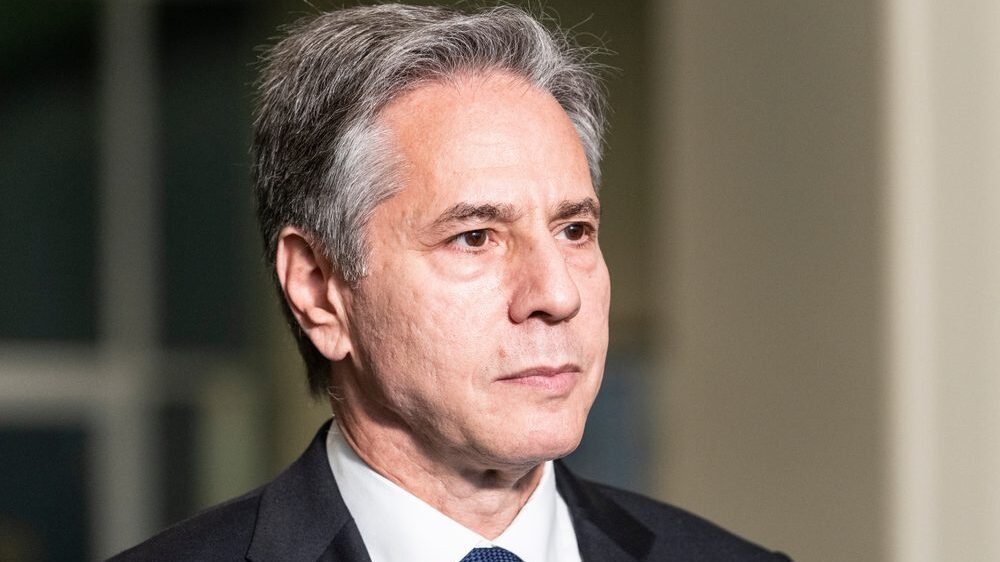
US Secretary of State Antony Blinken.
U.S. Secretary of State Antony Blinken, on Tuesday, February 21st, called upon fellow NATO allies, Greece and Turkey, to bury the hatchet. He made his comment while in Athens on the last leg of a multicountry day trip, which had taken him to Germany and Turkey.
The two neighbors, who share a historical animosity towards each other, are mired in a wide range of issues. Territorial disputes have engendered disagreements over the right to extract minerals in the Aegean, as well as the control of airspace. The ethnically diverse isle of Cyprus remains, as ever, a hot button issue.
Tensions flared last December when Turkish President Recep Tayyip Erdoğan declared that Turkey had the ability to hit Athens with short-range missile strikes.
At a joint news conference with Greek Foreign Minister Nikos Dendias, Blinken said it was “in the interest of both Greece and Türkiye”—the official name of the country, which the U.S. state department formally began using in January—”to find ways to resolve long-standing differences.” This, he noted, should be achieved “through dialogue, through diplomacy, to do it peacefully, and in the meantime, to not take any unilateral actions or use any charged rhetoric that would only make things more difficult and more challenging.”
He went on to say that both countries are nearing an election period, which “certainly sometimes creates incentives to engage in rhetoric that can create more problems than it solves, but that is also politics.” Greece is expected to hold a parliamentary election in April, while Turkey will hold a general election in June.
Dendias, whose government had sent earthquake relief to Turkey, including tents, beds, and blankets for the hundreds of thousands left homeless after the February 6th seismic event, said Athens was not expecting anything in return. “It is our obligation towards our fellow human beings, who are suffering, to help them, and I will—we will continue doing so,” Dendias said, reiterating that Greece did not expect anything in return for the aid it had provided.
Should the contact between the two peoples improve the “climate of their relations,” Dendias noted, this would of course be welcomed by Athens.
According to the latest tally, more than 47,000 have lost their lives in the earthquake that hit Turkey and Syria. On Tuesday, February 21st, a new earthquake killed six in the already ravaged, and now largely emptied, border region of Turkey and Syria.
Turning to energy, Blinken hinted at the role Greece might play as an energy hub in the region. With both countries aligned on implementing a “clean energy transition,” Blinken added there is an “enormous appetite among American companies to invest in Greece’s very significant move toward renewables.”
He added that Athens and Washington were cooperating to strengthen energy security across the region, which would entail reducing reliance on Russian gas. Greece and Turkey, he observed, could only then benefit from resolving their differences.
“I do believe strongly that there is an interest and an intent in both countries to find ways to resolve long-standing differences, to find ways to make this part of the world that they share an area of cooperation, not of conflict,” Blinken said.
On Monday, February 20th, Blinken met with Turkish Foreign Minister Mevlüt Çavuşoğlu in Ankara. While there, Blinken stressed Washington’s strong support for Sweden and Finland’s quick NATO accession, which Turkey has thus far opposed. “Finland and Sweden have already taken concrete steps to fulfill the commitments that they met under the trilateral memorandum of agreement that they signed,” Blinken noted.
Washington also reaffirmed its commitment to delivering F-16 jets to Turkey, despite Ankara insisting that their approval should not be dependent on whether it allows Sweden to join NATO. For the moment, negotiations on Sweden’s accession to NATO are deadlocked.
Blinken also announced an additional $50m in aid—bringing the total to $185 million in U.S. humanitarian assistance provided to Turkey and Syria in the wake of early February’s devastating earthquake.
“Turkey faces a long road ahead to support those rendered homeless and to rebuild, and we are committed to providing support,” he said. The day before, Blinken and Çavuşoğlu had taken a helicopter tour of Hatay, one of the worst hit provinces.
After Monday’s news conference, Blinken held a closed door meeting with Turkish President Recep Tayyip Erdoğan.
